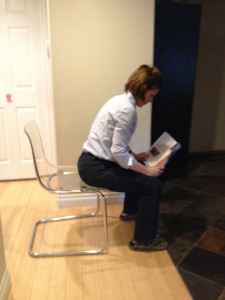Dear Dr. Oz,
You always tackle tough topics for your audience, and for that I am grateful. You have opened the door for conversations between women’s health practitioners like myself and women within our communities. I have written in the past to comment and add suggestions on show topics, in hopes of contributing our most up to date rehabilitative approaches to the conversation for issues such as pelvic organ prolapse and diastasis recti.
Today I wanted to add to the suggestions you made for women who are experiencing the need to “pee all the time”, seen here: http://www.doctoroz.com/videos/secret-reason-you-constantly-have-pee . Big kudos to your audience assistant, Patricia, for being willing to discuss her need to pee all the time on national TV. So many women will benefit from her openness.
You demonstrated via ultrasound that Patricia was retaining a lot of urine. Urinary retention is a clear reason for her constant need to use the restroom. But there is much she can do to address that level of retention beyond adding flax to her diet.
First, to facilitate getting all that urine out, she can address her potty posture. By changing her position on the potty she can encourage a more complete emptying of her bladder each time she goes. Specifically Patricia, and all women,should sit “like a dude” while on the potty- legs separated, pants at your ankles, upper body forward with arms resting on your thighs. In other words, sit as if holding a magazine. In addition, relax and plan to be there for awhile, this will help encourage complete emptying of the bladder each trip.
Second, women, such as Patricia, tend to reduce their fluid intake to theoretically reduce their need to pee. Less in, means less out, or so they think. Unfortunately this concentrates the urine, and makes it more irritating. Irritating, concentrated urine screams for attention and usually gets it with frequent, unproductive trips to the potty. So a look at Patricia’s fluid intake and counseling her, though counterintuitive, to adequately hydrate her system and dilute her urine, is a very important piece of the puzzle.
Third, often women are unaware that things they are eating are irritating to the urinary track. Processed foods, carbonated beverages, sugar, chocolate, citrus, tomatoes and alcohol are some of the no-no’s with a urinary issue. Caffeine is a big problem as well since it is a diuretic and will ultimately contribute to dehydration of the system and concentrate the urine. A look at diet, and making some simple changes could also have a big impact for Patirica, in addition to adding flax as you suggested. Here is a great resource for additional food and drink that can irritate the bladder.
Thanks again for opening the door for discussions by exploring tough to talk about topics on your show.
All the best,
Julie Wiebe, PT
www.juliewiebept.com
Clinician/Educator

10 thoughts on “Dear Dr. Oz…..why you constantly need to pee”
Great post, Julie! I’m hoping that Patricia, and others with similar issues, have access to this blog. Perhaps Dr. Oz will take note… If he were very savvy, he would invite YOU to his show to discuss these issues in person.
Thanks Joanie! Wouldn’t that be something! Julie
Great job of clarifying easy steps women can take to assist a common but little discussed concern.
Sher
Thanks for stopping by and weighing in! Julie
Great post Julie! I review the ICN website with all of my clients to educate them about dietary considerations, specifically, the most and least bothersome foods for their bladder. I have them highlight foods and beverages from the ICN Food List so they can have a better idea about which ones can potentially be irritating to their bladder. It usually is an eye-opening moment for them!
Hi Marci! What a great tool, could you share the link with everyone? Thanks for posting! Julie
The website is http://www.ic-network.com. Hover over “Self-Help Resources” then click on “Diet”. I recommend reading through the entire page with your clients. I stress to my patients that although the site targets individuals that have Interstitial Cystitis or Overactive Bladder, the information can apply to any person wanting to be proactive in promoting a healthier bladder. A healthier bladder can alleviate urgency, frequency and pelvic pain.
Great info, thanks Marci! Julie
Well said, as always. He also needs to hear about the role a hypertonic pelvic floor can play in urgency/frequency symptoms!
Thanks Stephanie! Welp, if this ever makes it across his desk…he is now aware :). Great point! Julie
Comments are closed.
This blog provides general information and discussion about medicine, health and related subjects. The words and other content provided in this blog, and in any linked materials, are not intended and should not be construed as medical advice. If the reader or any other person has a medical concern, he or she should consult with an appropriately licensed physician or other health care worker.
Never disregard professional medical advice or delay in seeking it because of something you have read on this blog or in any linked materials. If you think you may have a medical emergency, call your doctor or 911 immediately.